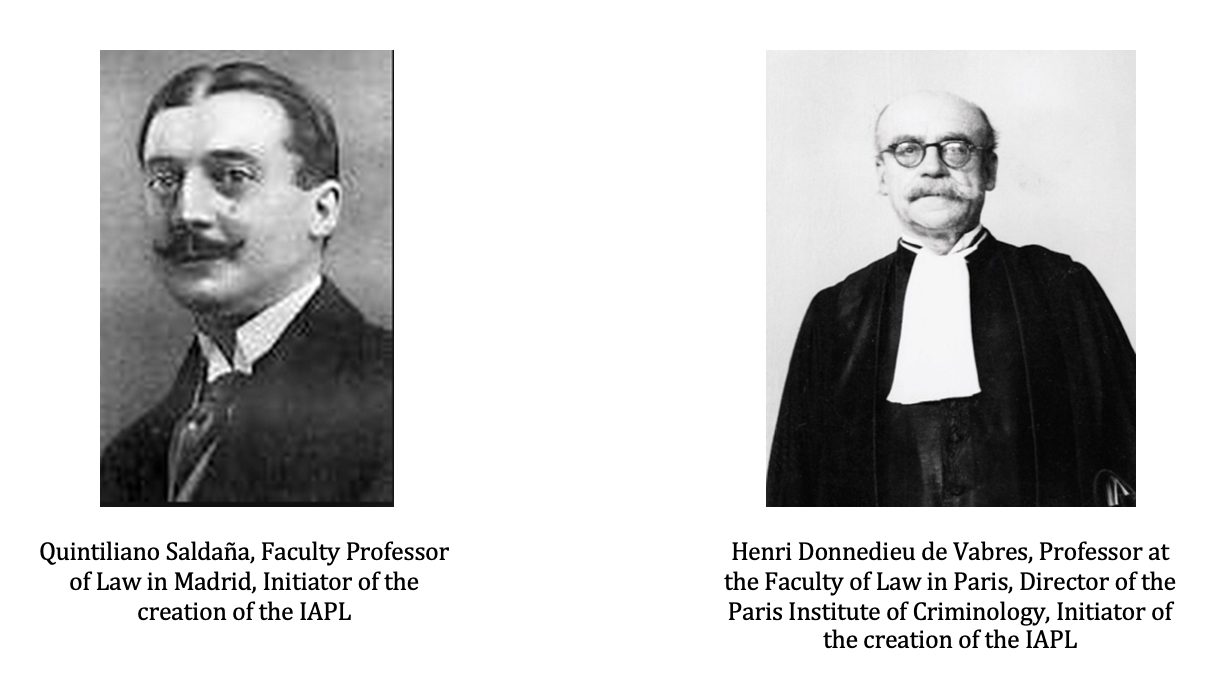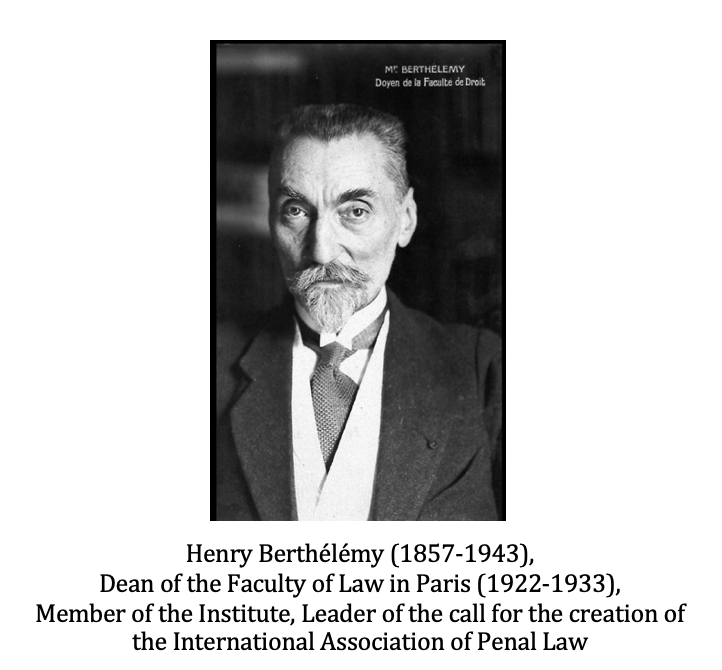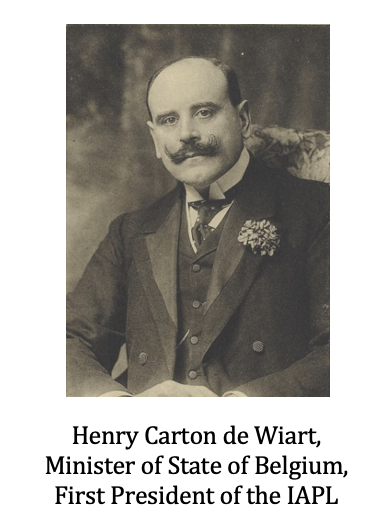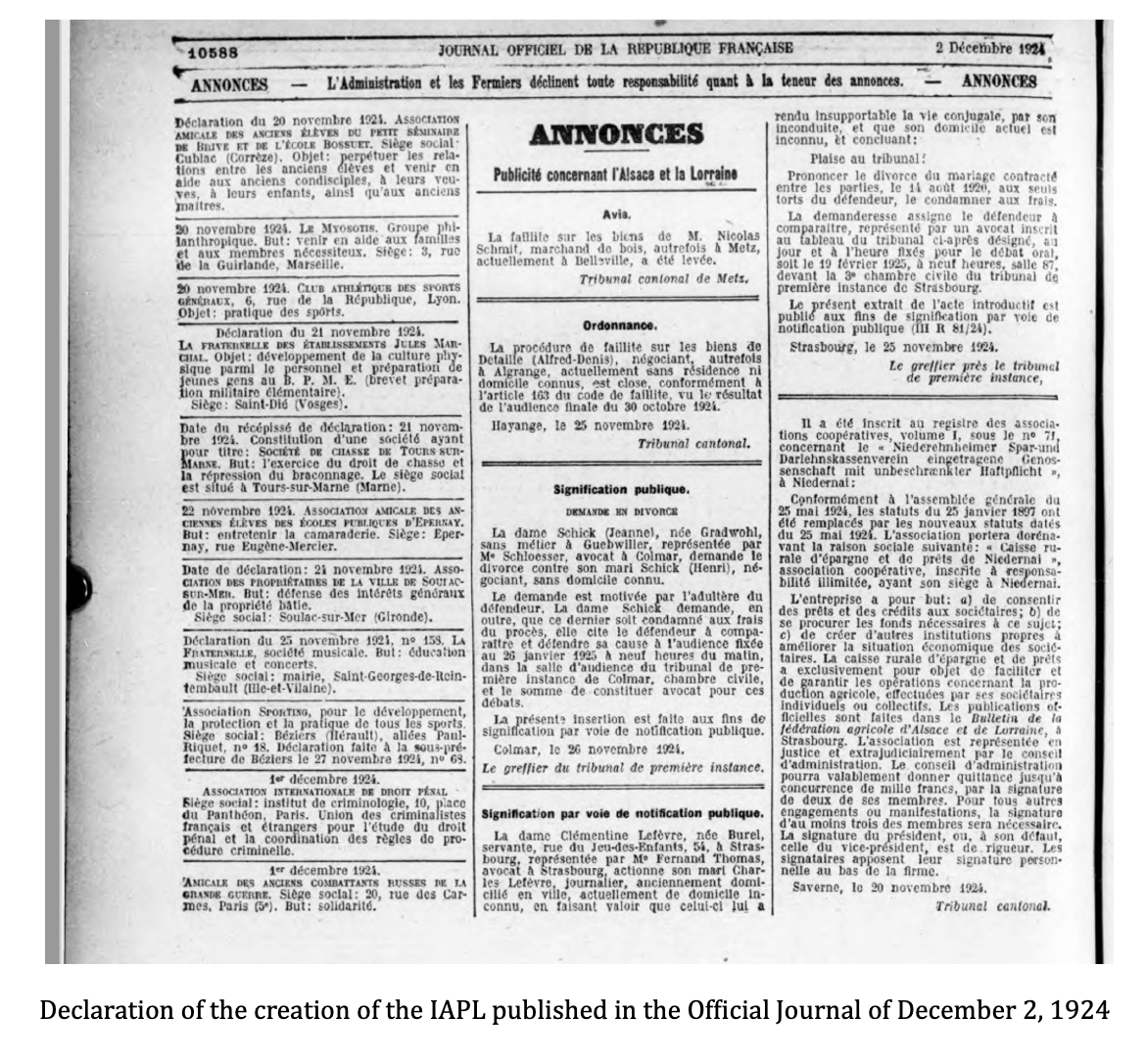History
In 1889, Professor Adolphe Prins of Belgian nationality, Professor Franz Von Listz of German nationality, and Professor Gérard Van Hamel of Dutch nationality created the International Union of Penal Law in Vienna.
The International Union of Penal Law aimed to bring together academics and intellectual specialists in criminal law from different countries. Its goal was to promote a both legal and sociological approach to the study of crime[1]. It drew inspiration from the Italian positivist school, marked by the works of Cesare Lombroso and Enrico Ferri, who contested the repressive evolution of criminal law observed at that time[2].
The activities of the International Union of Penal Law were interrupted by the First World War, leading to its "dislocation,"[3] especially since its founders passed away during this period[4].
In this context, Professor Quintiliano Saldaña of the Faculty of Law in Madrid contacted Professor Henri Donnedieu de Vabres of the Faculty of Law in Paris and Director of the Institute of Criminology in Paris to recreate an association following the model of the International Union of Penal Law[5].
Professor Donnedieu de Vabres discussed the project with Henry Berthélemy, a member of the Institute and Dean of the Faculty of Law in Paris.

Dean Berthélémy established a commission that sought support and drafted a set of statutes[6]. It was during these preparatory works that a call was made by seven French personalities and academics for the creation of an International Association of Penal Law:
This call proclaimed, among other things:
« We consider it opportune to resume, through the creation of an International Association of Penal Law, the work that the International Union left unfinished. (...)
We have no political aims. We do not subordinate our work to any scientific creed. All schools fighting in the field of criminal law can be proud of possessing a part of the truth. None can claim a monopoly.
Addressing all nations that are loyal to peace and resolutely pacifist, we appeal to all those interested in the study of criminal law, criminology, or penology. The problems they raise are significant and distressing enough to be tackled together, in a scientific spirit, with no other concern than the desire to establish more justice and help a disrupted and wounded humanity. »[7]
This call is the origin of the creation of the International Association in 1924, which therefore has its direct origin at the Faculty of Law in Paris, as its creation resulted from work carried out within it by its Dean, Professor Henry Berthélémy, and by Professor Henri Donnedieu de Vabres, who was also the Director of the Institute of Criminology in Paris (ICP).

This creation received the support of the President of the Council, former President of the Republic, Raymond Poincaré, as reported by Dean Henry Berthélémy:
« We have received very valuable encouragement and solid support: in Paris first, that of Mr. President Poincaré, who is ready to favorably welcome all generous ideas capable of bringing a little more peace and courtesy between peoples and promoting the development of civilization. »[8]
Footnotes
- [1] See : J. Vervaele, UIDP/AIDP : 125 ans au service de la Justice criminelle, de l’Humanité et des droits de l’homme, Revue internationale de droit pénal (vol. 86), 2015, p. 738.
- [2] C. Bassiouni, Un siècle de service consacré à la justice criminelle et aux droits de l’homme : L’Association internationale de droit pénal et l’Institut des hautes études en sciences criminelles, Revue internationale de droit pénal (vol. 73), 1990, p. 29, spéc. p. 31.
- [3] The word « dislocation » is used in the call for a « Projet d’une association internationale de droit pénale » publié et diffusé en 1924 comme fondement de la création de l’AIDP (Revue internationale de droit pénal n° 1, 1924, p. 1).
- [4] Van Hamel died in 1917, Von Liszt in 1919 and Prins in 1920.
- [5] Revue internationale de droit pénal, 1924, p. 4.
- [6] Revue internationale de droit pénal, 1924, p. 5.
- [7] « Projet d’une association internationale de droit pénale », Revue internationale de droit pénal, 1924 ; p. 1.The signatories of this call were: Henry Berthélemy, Member of the Institute and Dean of the Faculty of Law in Paris, Georges Leredu, former minister and President of the Société générale des prisons, Albert Rivière, former President of the Société générale des prisons, Jean-Antoine Roux, Professor at the University of Strasbourg, Commander R. Julien, Secretary-General of the Société générale des prisons, Louis Hugueney, Professor at the Faculty of Law in Paris, Henri Donnedieu de Vabres, Professor at the Faculty of Law in Paris.
- [8] Revue internationale de droit pénal, 1924, p. 4.
The IAPL was founded on March 28, 1924. This creation took the form of an association under the law of July 1, 1901, which explains the designation "Association." It is the origin of its French name, which is still in use.
While the IAPL took up the legacy of the International Union of Penal Law, as evidenced by both the call for its creation and the definition of its object using the term "Union," it was legally and effectively distinct from the International Union of Penal Law. This establishes that its creation dates back to its constituent assembly in 1924 and not to the date of the creation of the International Union of Penal Law. The German group of the International Union continued its activity until 1937[1]. It had also refused to participate in the 1st Congress of the IAPL in 1926[2].
The constituent assembly of the IAPL was held at the premises of the Faculty of Law in Paris[3]. It was precisely because of this creation in Paris that the IAPL decided to organise its XXIst Congress in Paris, corresponding to the centenary of this creation.
The constituent assembly was chaired by Louis Barthou, who was then a senator and President of the Reparations Commission and had been Prime Minister from March 22 to December 9, 1913.
The constituent assembly elected Henry Carton de Wiart, Minister of State of Belgium, as President of the IAPL, and Mr. Jean-André Roux, Professor at the University of Strasbourg, as Secretary-General of the IAPL. Professors Louis Hugueney and Henri Donnedieu de Vabres were appointed Secretaries of the Association's Bureau.

Article 1 of the IAPL statutes in 1924 use to read as follows:
« An International Association of Penal Law is founded.
Its purpose is:
1° to establish closer cooperation and collaboration among those who, in different countries, dedicate themselves to the theoretical study of criminal law or participate in its application ;
2° to study crime and its causes, the means to combat it, and the reforms that need to be made to criminal law, the penitentiary system, and criminal procedure ;
3° to promote the theoretical and practical development of the international criminal law, with a view to conceiving a universal criminal law, coordinating rules of criminal procedure and instruction.It takes no side between the various schools of criminologists.
Its headquarters are in Paris. »
This article is the origin of the establishment of the IAPL headquarters in Paris. The headquarters, at the time of its creation, was the Paris Institute of Criminology, as evidenced by the Official Journal of December 2, 1924, reporting the Declaration of creation to the Police Prefecture on December 1, 1924, reproduced below:

The meeting of the IAPL on May 18, 1946, at the International Military Tribunal in Nuremberg, reaffirmed the principle of keeping its headquarters in Paris[4]. Subsequently, the modified statutes of the IAPL continued to designate its registered office in Paris[5].
The headquarters of the IAPL remained at the Paris Institute of Criminology until 2014 when it was relocated to 12 Rue Charles Fourier in the 13th arrondissement, which is the address of the Paris Probation and Insertion Service (SPIP). The change of registered office coincided with a name change, and the new name became "Association internationale de droit pénal (AIDP-IAPL)."[6] However, this change was limited to adding the acronym in French and English to the name "Association internationale de droit pénal," which remains in French.
The IAPL's headquarters has recently been moved to the Court of Appeal in Paris, maintaining its presence in the city.
Article 1 of the statutes adopted in 1924 also highlights the immediate interest and importance given to international criminal law, particularly in the development of criminal rules capable of addressing the challenges of prosecuting international offenes.
Footnotes
- [1] P. Cornil, Réflexions sur le cinquantenaire de l’Association internationale de droit pénal, Revue internationale de droit pénal 1975, p. 387, spéc. p. 388.
- [2] J. Vervaele, UIDP/AIDP : 125 ans au service de la Justice criminelle, de l’Humanité et des droits de l’homme, Revue internationale de droit pénal (vol. 86), 2015, p. 738, spéc. p. 741.
- [3] The report of the constituent General Assembly were published in the first issue of the Revue internationale de droit pénal (1924, p. 3 à 16).
- [4] Procès-verbal de la réunion de l’AIDP siège du Tribunal militaire international (Nuremberg) 18 mai 1946, Revue internationale de droit pénal (vol. 73), 2002, p. 321, spéc. p. 325 et s.
- [5] The statutes of the IAPL were modified in 1958 and in 1970.
- [6] https://www.journal-officiel.gouv.fr/pages/associations-detail-annonce/?q.id=id:201400061383
In 2015, Professor John A.E. Vervaele, President of the IAPL since 2014, wrote in French:
« En 2024, l’AIDP fêtera le centenaire de sa création à Paris. Cette célébration sera certainement l’occasion de revenir sur l’héritage de l’Association mais sera également un moment propice à l’évaluation du rôle que l’AIDP aura à jouer dans le futur. La mission de codification de la loi et des normes pénales n’est plus la même aujourd’hui qu’elle n’était il y a cent ans. La future digitalisation et robotisation de la société va continuer de défier les fondements de la justice pénale. Les limites de cette dernière imposées par les droits de l’homme resteront au centre des préoccupations. »[1]
These reflections gave rise to the theme of the 21st Congress of the IAPL, which is "Artificial Intelligence and Criminal Law," chosen during the 20th Congress held in Rome in 2020 at LUISS University (Libera Universita Internazionale degli Studi Sociali). The 20th Congress wished for the 21st Congress to take place in Paris in 2024, corresponding to the centenary of the IAPL's creation.
The IAPL Board contacted the AFDP, the French national group, to ask them to organise the 21st Congress in France in 2024.
The AFDP contacted Professor Didier Rebut, Director of the Paris Institute of Criminology and Criminal Law (ICP), which was the IAPL's headquarters until 2014, to inquire whether he would accept, on behalf of the ICP and of the University of Paris-Panthéon-Assas to which the ICP is attached, and the AFDP, to organise the 21st IAPL Congress.
Professor Didier Rebut accepted to organise the 21st Congress of the IAPL: (i) to commemorate the centenary of the IAPL at the very place where it was created in 1924, (ii) to pay tribute to the eminent French members who are at the origin of its creation and have actively participated in its activities during the past century, and (iii) to contribute to reaffirming the place and investment of French jurists in the IAPL.
The Congress dates have been set for June 25-28, 2024.
The Congress venues are historical buildings of the Faculty of Law in Paris, the University of Paris-Panthéon-Assas, and the Academy of Moral and Political Sciences[2].
Footnotes
In 1889, Professor Adolphe Prins of Belgian nationality, Professor Franz Von Listz of German nationality, and Professor Gérard Van Hamel of Dutch nationality created the International Union of Penal Law in Vienna.
The International Union of Penal Law aimed to bring together academics and intellectual specialists in criminal law from different countries. Its goal was to promote a both legal and sociological approach to the study of crime[1]. It drew inspiration from the Italian positivist school, marked by the works of Cesare Lombroso and Enrico Ferri, who contested the repressive evolution of criminal law observed at that time[2].
The activities of the International Union of Penal Law were interrupted by the First World War, leading to its "dislocation,"[3] especially since its founders passed away during this period[4].
In this context, Professor Quintiliano Saldaña of the Faculty of Law in Madrid contacted Professor Henri Donnedieu de Vabres of the Faculty of Law in Paris and Director of the Institute of Criminology in Paris to recreate an association following the model of the International Union of Penal Law[5].
Professor Donnedieu de Vabres discussed the project with Henry Berthélemy, a member of the Institute and Dean of the Faculty of Law in Paris.

Dean Berthélémy established a commission that sought support and drafted a set of statutes[6]. It was during these preparatory works that a call was made by seven French personalities and academics for the creation of an International Association of Penal Law:
This call proclaimed, among other things:
« We consider it opportune to resume, through the creation of an International Association of Penal Law, the work that the International Union left unfinished. (...)
We have no political aims. We do not subordinate our work to any scientific creed. All schools fighting in the field of criminal law can be proud of possessing a part of the truth. None can claim a monopoly.
Addressing all nations that are loyal to peace and resolutely pacifist, we appeal to all those interested in the study of criminal law, criminology, or penology. The problems they raise are significant and distressing enough to be tackled together, in a scientific spirit, with no other concern than the desire to establish more justice and help a disrupted and wounded humanity. »[7]
This call is the origin of the creation of the International Association in 1924, which therefore has its direct origin at the Faculty of Law in Paris, as its creation resulted from work carried out within it by its Dean, Professor Henry Berthélémy, and by Professor Henri Donnedieu de Vabres, who was also the Director of the Institute of Criminology in Paris (ICP).

This creation received the support of the President of the Council, former President of the Republic, Raymond Poincaré, as reported by Dean Henry Berthélémy:
« We have received very valuable encouragement and solid support: in Paris first, that of Mr. President Poincaré, who is ready to favorably welcome all generous ideas capable of bringing a little more peace and courtesy between peoples and promoting the development of civilization. »[8]
Footnotes
- [1] See : J. Vervaele, UIDP/AIDP : 125 ans au service de la Justice criminelle, de l’Humanité et des droits de l’homme, Revue internationale de droit pénal (vol. 86), 2015, p. 738.
- [2] C. Bassiouni, Un siècle de service consacré à la justice criminelle et aux droits de l’homme : L’Association internationale de droit pénal et l’Institut des hautes études en sciences criminelles, Revue internationale de droit pénal (vol. 73), 1990, p. 29, spéc. p. 31.
- [3] The word « dislocation » is used in the call for a « Projet d’une association internationale de droit pénale » publié et diffusé en 1924 comme fondement de la création de l’AIDP (Revue internationale de droit pénal n° 1, 1924, p. 1).
- [4] Van Hamel died in 1917, Von Liszt in 1919 and Prins in 1920.
- [5] Revue internationale de droit pénal, 1924, p. 4.
- [6] Revue internationale de droit pénal, 1924, p. 5.
- [7] « Projet d’une association internationale de droit pénale », Revue internationale de droit pénal, 1924 ; p. 1.The signatories of this call were: Henry Berthélemy, Member of the Institute and Dean of the Faculty of Law in Paris, Georges Leredu, former minister and President of the Société générale des prisons, Albert Rivière, former President of the Société générale des prisons, Jean-Antoine Roux, Professor at the University of Strasbourg, Commander R. Julien, Secretary-General of the Société générale des prisons, Louis Hugueney, Professor at the Faculty of Law in Paris, Henri Donnedieu de Vabres, Professor at the Faculty of Law in Paris.
- [8] Revue internationale de droit pénal, 1924, p. 4.
The IAPL was founded on March 28, 1924. This creation took the form of an association under the law of July 1, 1901, which explains the designation "Association." It is the origin of its French name, which is still in use.
While the IAPL took up the legacy of the International Union of Penal Law, as evidenced by both the call for its creation and the definition of its object using the term "Union," it was legally and effectively distinct from the International Union of Penal Law. This establishes that its creation dates back to its constituent assembly in 1924 and not to the date of the creation of the International Union of Penal Law. The German group of the International Union continued its activity until 1937[1]. It had also refused to participate in the 1st Congress of the IAPL in 1926[2].
The constituent assembly of the IAPL was held at the premises of the Faculty of Law in Paris[3]. It was precisely because of this creation in Paris that the IAPL decided to organise its XXIst Congress in Paris, corresponding to the centenary of this creation.
The constituent assembly was chaired by Louis Barthou, who was then a senator and President of the Reparations Commission and had been Prime Minister from March 22 to December 9, 1913.
The constituent assembly elected Henry Carton de Wiart, Minister of State of Belgium, as President of the IAPL, and Mr. Jean-André Roux, Professor at the University of Strasbourg, as Secretary-General of the IAPL. Professors Louis Hugueney and Henri Donnedieu de Vabres were appointed Secretaries of the Association's Bureau.

Article 1 of the IAPL statutes in 1924 use to read as follows:
« An International Association of Penal Law is founded.
Its purpose is:
1° to establish closer cooperation and collaboration among those who, in different countries, dedicate themselves to the theoretical study of criminal law or participate in its application ;
2° to study crime and its causes, the means to combat it, and the reforms that need to be made to criminal law, the penitentiary system, and criminal procedure ;
3° to promote the theoretical and practical development of the international criminal law, with a view to conceiving a universal criminal law, coordinating rules of criminal procedure and instruction.It takes no side between the various schools of criminologists.
Its headquarters are in Paris. »
This article is the origin of the establishment of the IAPL headquarters in Paris. The headquarters, at the time of its creation, was the Paris Institute of Criminology, as evidenced by the Official Journal of December 2, 1924, reporting the Declaration of creation to the Police Prefecture on December 1, 1924, reproduced below:

The meeting of the IAPL on May 18, 1946, at the International Military Tribunal in Nuremberg, reaffirmed the principle of keeping its headquarters in Paris[4]. Subsequently, the modified statutes of the IAPL continued to designate its registered office in Paris[5].
The headquarters of the IAPL remained at the Paris Institute of Criminology until 2014 when it was relocated to 12 Rue Charles Fourier in the 13th arrondissement, which is the address of the Paris Probation and Insertion Service (SPIP). The change of registered office coincided with a name change, and the new name became "Association internationale de droit pénal (AIDP-IAPL)."[6] However, this change was limited to adding the acronym in French and English to the name "Association internationale de droit pénal," which remains in French.
The IAPL's headquarters has recently been moved to the Court of Appeal in Paris, maintaining its presence in the city.
Article 1 of the statutes adopted in 1924 also highlights the immediate interest and importance given to international criminal law, particularly in the development of criminal rules capable of addressing the challenges of prosecuting international offenes.
Footnotes
- [1] P. Cornil, Réflexions sur le cinquantenaire de l’Association internationale de droit pénal, Revue internationale de droit pénal 1975, p. 387, spéc. p. 388.
- [2] J. Vervaele, UIDP/AIDP : 125 ans au service de la Justice criminelle, de l’Humanité et des droits de l’homme, Revue internationale de droit pénal (vol. 86), 2015, p. 738, spéc. p. 741.
- [3] The report of the constituent General Assembly were published in the first issue of the Revue internationale de droit pénal (1924, p. 3 à 16).
- [4] Procès-verbal de la réunion de l’AIDP siège du Tribunal militaire international (Nuremberg) 18 mai 1946, Revue internationale de droit pénal (vol. 73), 2002, p. 321, spéc. p. 325 et s.
- [5] The statutes of the IAPL were modified in 1958 and in 1970.
- [6] https://www.journal-officiel.gouv.fr/pages/associations-detail-annonce/?q.id=id:201400061383
In 2015, Professor John A.E. Vervaele, President of the IAPL since 2014, wrote in French:
« En 2024, l’AIDP fêtera le centenaire de sa création à Paris. Cette célébration sera certainement l’occasion de revenir sur l’héritage de l’Association mais sera également un moment propice à l’évaluation du rôle que l’AIDP aura à jouer dans le futur. La mission de codification de la loi et des normes pénales n’est plus la même aujourd’hui qu’elle n’était il y a cent ans. La future digitalisation et robotisation de la société va continuer de défier les fondements de la justice pénale. Les limites de cette dernière imposées par les droits de l’homme resteront au centre des préoccupations. »[1]
These reflections gave rise to the theme of the 21st Congress of the IAPL, which is "Artificial Intelligence and Criminal Law," chosen during the 20th Congress held in Rome in 2020 at LUISS University (Libera Universita Internazionale degli Studi Sociali). The 20th Congress wished for the 21st Congress to take place in Paris in 2024, corresponding to the centenary of the IAPL's creation.
The IAPL Board contacted the AFDP, the French national group, to ask them to organise the 21st Congress in France in 2024.
The AFDP contacted Professor Didier Rebut, Director of the Paris Institute of Criminology and Criminal Law (ICP), which was the IAPL's headquarters until 2014, to inquire whether he would accept, on behalf of the ICP and of the University of Paris-Panthéon-Assas to which the ICP is attached, and the AFDP, to organise the 21st IAPL Congress.
Professor Didier Rebut accepted to organise the 21st Congress of the IAPL: (i) to commemorate the centenary of the IAPL at the very place where it was created in 1924, (ii) to pay tribute to the eminent French members who are at the origin of its creation and have actively participated in its activities during the past century, and (iii) to contribute to reaffirming the place and investment of French jurists in the IAPL.
The Congress dates have been set for June 25-28, 2024.
The Congress venues are historical buildings of the Faculty of Law in Paris, the University of Paris-Panthéon-Assas, and the Academy of Moral and Political Sciences[2].
